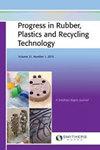Nanokaolin reinforced carboxylated nitrile butadiene rubber/polyurethane blend-based latex with enhanced tensile properties and chemical resistance
IF 1.6
4区 材料科学
Q4 MATERIALS SCIENCE, COMPOSITES
Progress in Rubber Plastics and Recycling Technology
Pub Date : 2023-02-28
DOI:10.1177/14777606231161368
引用次数: 2
Abstract
The demand for gloves (e.g., disposable gloves, medical gloves) is increasing due to the Coronavirus disease 2019 (COVID-19) pandemic. Stability in the supply chain in the glove industry is important, and thus strategies are used to solve the problem of the shortage of nitrile gloves. The blending of nitrile butadiene rubber (NBR) with polyurethane (PU) and the use of the nanocomposite concept is among the feasible approaches. The present study aims to investigate the effects of nanokaolin (NK) on the tensile and chemical properties of carboxylated nitrile butadiene rubber (NBR)/polyurethane (PU) latex blends. Three different loadings of NK (10, 20, and 30 parts per hundred rubber) were added to the NBR/PU (at a blending ratio of 85/15). The zeta potential showed that all the NBR compounds exhibit good colloidal stability. The incorporation of NK increased the crosslink density and tensile strength of the NBR/PU latex blends. The highest tensile strength was achieved when the NK loading was 20 phr. All the NBR blends and nanocomposites (NBR/PU-based) possess tensile properties that fulfill the requirements for glove application. The chemical resistance of NBR compounds was increased by the incorporation of NK due to the higher crosslink density and barrier properties contributed by the NK.纳米高岭土增强羧化丁腈橡胶/聚氨酯共混乳胶具有增强的拉伸性能和耐化学性
由于2019冠状病毒病(COVID-19)大流行,对手套(如一次性手套、医用手套)的需求正在增加。手套行业供应链的稳定性很重要,因此采用了一些策略来解决丁腈手套短缺的问题。丁腈橡胶(NBR)与聚氨酯(PU)共混以及纳米复合材料概念的应用是可行的方法之一。本研究旨在研究纳米高岭土(NK)对羧基丁腈橡胶(NBR)/聚氨酯(PU)乳胶共混物的拉伸和化学性能的影响。在NBR/PU中添加了三种不同的NK(10、20和30 /百份橡胶)(混合比为85/15)。zeta电位表明,所有丁腈橡胶均表现出良好的胶体稳定性。NK的加入提高了NBR/PU乳胶共混物的交联密度和拉伸强度。当NK负载为20 phr时,拉伸强度达到最高。所有的NBR共混物和纳米复合材料(NBR/ pu基)都具有满足手套应用要求的拉伸性能。NK的加入提高了丁腈橡胶的耐化学性,因为NK提供了更高的交联密度和屏障性能。
本文章由计算机程序翻译,如有差异,请以英文原文为准。
求助全文
约1分钟内获得全文
求助全文
来源期刊

Progress in Rubber Plastics and Recycling Technology
MATERIALS SCIENCE, COMPOSITES-POLYMER SCIENCE
CiteScore
4.40
自引率
7.70%
发文量
18
审稿时长
>12 weeks
期刊介绍:
The journal aims to bridge the gap between research and development and the practical and commercial applications of polymers in a wide range of uses. Current developments and likely future trends are reviewed across key areas of the polymer industry, together with existing and potential opportunities for the innovative use of plastic and rubber products.
 求助内容:
求助内容: 应助结果提醒方式:
应助结果提醒方式:


